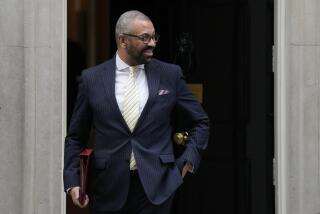Canada Moves to Limit Immigration : Policy: The shift away from giving priority to recent arrivals’ family members signals U-turn by government.
- Share via
TORONTO — As Californians prepare to vote Tuesday on whether to cut off most public social services to illegal immigrants, an emotional debate is surging through Canada on a similar issue.
While illegal immigration is negligible in Canada, in recent years there has been a growing chorus of complaint that legal immigrants cost Canadian taxpayers too much in welfare and other social services.
In response, Immigration Minister Sergio Marchi this week announced a drop in legal immigration levels for the coming year and a policy shift away from family unification and toward immigrants who bring with them sought-after work skills, personal wealth and an ability to speak English or French, Canada’s official languages.
“The days when Canada required a large pool of unskilled labor are long gone,” said Marchi in a report to Parliament. “Today the country needs people who are entrepreneurial, have good language skills and are able to adjust to a rapidly changing labor market. The criteria used to select immigrants must reflect this change.”
The reaction was immediate and heated.
“The real reason why people want to limit immigration is racism,” said Emmanuel Dick, vice president of the Canadian Ethnocultural Council. “There is still the prevailing colonial mind-set in this country that ‘real Canadians’ are only those who are descended from British and French stock.”
On the political right, the new policy was denounced as not going far enough. “Pure smoke and mirrors,” pronounced Art Hanger, a member of Parliament from Calgary and spokesman for the conservative Reform Party, which has made restriction of immigration an integral part of its platform.
Marchi’s announcement represents a political U-turn for the governing Liberal Party of Prime Minister Jean Chretien, who campaigned last year on pledges to hold immigration to recent levels and continue to give priority to family unification.
It also is laden with irony for Marchi, who arrived in Canada from Argentina at age 3 with his Italian-born parents. Marchi, 38, is fond of talking about how his father arrived in Canada with $40 and no English and found success. Asked by reporters whether his father would have made it into the country under the new rules, Marchi replied that times have changed.
Canada, the United States, Australia and Israel are the only nations that accept large numbers of legal immigrants. In recent years, Canada has set immigration levels at about 1% of the total population.
Like Americans, Canadians regard their country a land of opportunity and freedom for newcomers. But a backlash against immigration has been building in recent years, coinciding with an increase in immigration from Asia, a long, deep recession that is just ending and the arrest of immigrants in a few highly publicized crimes this year, mainly in Toronto.
Much of the criticism is directed against family unification, a program that allows recent arrivals to Canada to sponsor the immigration of family members, including adult children, parents and grandparents, on the promise that they will provide financial support.
Although statistics show that a smaller percentage of immigrants receives social assistance than the Canadian public at large, Marchi estimated that lapsed sponsorships cost Canada $700 million in social assistance to immigrants last year.
Marchi said the government will lower total immigration from a projected 230,000 this year to between 190,000 and 215,000 in 1995. The family unification program will be directed more at spouses and minor children, and applicants will have to show that they can maintain a sponsorship, including perhaps posting a bond.
Over the rest of the decade, the government intends to reduce the percentage of family unification immigration from 51% to 44%. Immigrants admitted for economic reasons--those with desired skills and capital--will increase from 43% to 53% over the same period.
Canada will also increase the number of political refugees accepted next year from 24,000 to 32,000.
In what is becoming a trademark of the Chretien government, the policy change was announced after a long period of public hearings and study. Marchi said more than 10,000 Canadians were consulted in the process. Similar studies are under way on foreign policy and reform of social assistance programs. A review of defense policy also was just recently completed.
More to Read
Sign up for Essential California
The most important California stories and recommendations in your inbox every morning.
You may occasionally receive promotional content from the Los Angeles Times.










